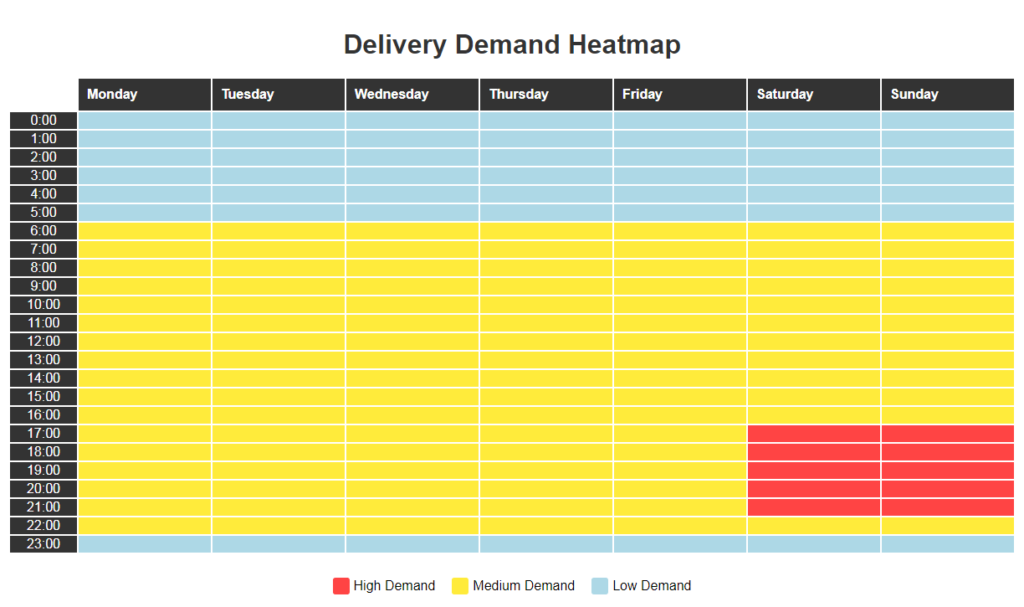What days are business days for food delivery gig workers? Learn how they impact your schedule, earnings, and financial planning.
If you’re a food delivery gig worker, your schedule probably doesn’t stick to the usual 9-to-5. You’re constantly handling orders, customer requests, and app alerts, often working odd hours and weekends. But here’s the thing, knowing what “business days” actually mean in the gig economy can make a big difference when it comes to managing your money and staying organized.
For those exploring working from home tips, understanding how to manage flexible schedules is just as crucial.
In this article, we’ll break down what “business days” mean for gig workers, why they matter, and how you can use that knowledge to boost your earnings and plan your schedule better. Let’s get into it.
Article Breakdown
What Days Are Business Days? (Gig Work)

Traditionally, business days are Monday through Friday, excluding weekends and public holidays. They’re the backbone of schedules for banks, corporations, and many service-based industries. But for gig workers, especially those in food delivery, the definition can feel a bit… irrelevant.
Take my story, for instance: when I started with DoorDash, I was logging 12-hour days on weekends, raking in peak bonuses. Meanwhile, Mondays, typically a business day, were slow as molasses. It became clear that “business days” in my world had more to do with customer demand and platform algorithms than with the traditional calendar.
Gig Worker’s “Business Days”: A Fresh Perspective
For food delivery gig workers, business days are less about Monday-to-Friday and more about:
- Payment Cycles: When payouts process and land in your bank account.
- High-Demand Times: Evening rushes, weekends, and holidays, basically, when customers are too busy or tired to cook.
- Platform-Specific Patterns: Each app, whether it’s Uber Eats, DoorDash, or Grubhub, has unique rhythms for incentives and scheduling.
Understanding these nuances helps you stay ahead, both in planning your time and optimizing your earnings.
How Payment Cycles Define Business Days for Gig Workers
Let’s get real: financial stability as a gig worker often feels like juggling flaming torches. Knowing when your hard-earned money will hit your bank account is crucial.
Platform Payment Schedules
Most food delivery apps follow traditional business day cycles for payments. For example:
- DoorDash: Direct deposits typically process on Monday and arrive by Wednesday, depending on your bank.
- Uber Eats: Weekly payouts process on Thursdays.
- Grubhub: Payments go out every Thursday, hitting accounts by Friday or Monday.
Key Tip: Banking holidays can delay payments by an extra day or two. If you’re relying on that deposit to pay bills, plan accordingly.
High-Demand Times: The Real “Business Days” for Gig Workers

Forget the corporate 9-to-5, your “business days” are driven by customer habits. Peak times in food delivery tend to revolve around:
Evenings and Weekends
People order dinner after long workdays or when they’re too busy to cook. This makes Friday and Saturday nights goldmines for delivery workers. I’ve personally made more on a single Friday night than in three slow weekdays combined.
Holidays and Events
Super Bowl Sunday, Valentine’s Day, and even Thanksgiving can see a surge in orders. During these times, platforms often roll out extra incentives, like bonuses for completing a certain number of deliveries.
Slow Days
Conversely, Mondays and Tuesdays are typically quieter. This doesn’t mean you shouldn’t work, but these days are better suited for shorter shifts or planning around your peak hours.
Think of your work like running a food truck. You’d set up shop where the crowds are, not in an empty parking lot, right? The same logic applies here.
Understanding Platform-Specific Patterns
Each delivery platform has quirks that can redefine your “business days.” Let’s break them down:
DoorDash
- Peak Pay: Bonuses during busy times, often weekends or lunch/dinner rushes.
- Challenges: Earn extra by completing a set number of deliveries within a specific period.
Uber Eats
- Surge Pricing: Higher pay during high-demand times, especially in urban areas.
- Quest Bonuses: Incentives for completing a target number of deliveries.
Grubhub
- Block Scheduling: Prioritize shifts during predictable busy hours for higher earnings.
- Contribution Pay: Earn a guaranteed minimum if you’re active but not receiving enough orders.
Pro Tip: Keep an eye on app notifications, platforms often announce bonuses or new features that can redefine your schedule.
Maximizing Earnings Around Business Days
The beauty of gig work is flexibility. But to make the most of it, you’ve got to work smarter, not harder. Here’s how:
Plan Around Peak Hours
Use the app’s heat maps or personal experience to identify when and where demand is highest. For example, downtown areas are usually bustling during lunch hours, while residential neighborhoods pick up at dinner.
Leverage Incentives
Actively chase promotions like Peak Pay or Quest Bonuses. A $2 bonus per delivery might not sound like much, but over 20 deliveries, that’s $40 extra in your pocket.
Avoid Burnout
Working weekends and holidays can be lucrative, but overdoing it leads to burnout. Balance high-demand shifts with lighter days to maintain your health and motivation.
Analogy: Treat your gig work like farming. Sow (work) during fertile seasons (peak times) and rest or plan during off-seasons (slow days).
Challenges and Solutions
When I first started, I often miscalculated how “business days” would impact my cash flow. One Monday, after a busy weekend, I realized my deposit wouldn’t hit until Wednesday, and I had bills due Tuesday. It was a hard lesson in planning, but it pushed me to:
- Track platform payment schedules meticulously.
- Build a small emergency fund to buffer delays.
- Use instant pay options sparingly (those fees add up!).
Tools to Make Life Easier
Here are a few resources that can help you stay on top:
- Finance Apps: Tools like Mint or You Need a Budget (YNAB) to manage cash flow.
- Community Groups: Join gig worker forums or Facebook groups for local tips and camaraderie.
- Delivery Apps: Use apps like Gridwise to track peak hours, mileage, and earnings.
Redefine Your Business Days
The gig economy doesn’t follow the rules of traditional workweeks, and neither should you. By understanding what “business days” mean for food delivery, you can:
- Predict your payments.
- Strategically plan shifts.
- Maximize bonuses and minimize downtime.
Take control of your schedule, stay adaptable, and keep hustling. Because when you redefine your business days, every day can be a winning day in the gig economy.
Useful Articles:
- Managing Gig Worker Earnings: 5 Tips: Learn how to effectively manage your income and budgeting as a gig worker.
- 5 Financial Tips for Gig Workers: Practical advice to help gig workers stay financially secure and plan for the future.
- Delivery Driver Tips and Tricks: What I Learned: A firsthand account with useful tips for delivery drivers to maximize efficiency and earnings.



